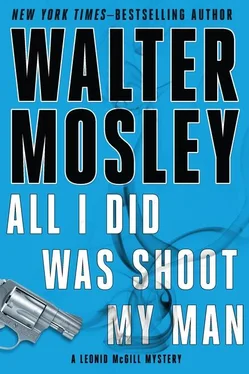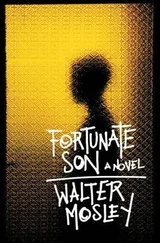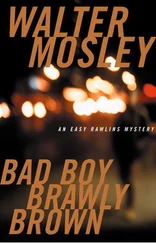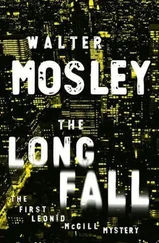“Neither are we,” she said, “but you’re my man just like he’s your blood.”
For a change I was in the office before Mardi and Twill. I sat behind her ash desk, flipping through the notes she wrote in light purple ink.
She kept detailed handwritten records of every case I’d had since she’d been with me. She also had some more sketchy coverage gleaned from audiotapes I kept from previous jobs.
Mardi had a deeper understanding of human nature than did I. I could see, often, what people were trying to hide. But Mardi saw what was hidden beyond vain attempts.
Her take on a job I’d done three months before was especially enlightening.
A woman had come to me worried about what was going to happen with her ex-husband. He had been sending her threatening e-mails and leaving certain disturbing items at her doorstep. A thug named Lassiter had appeared at various places she frequented; her job, the supermarket, and sometimes he drove by her on the highway and would ring her cell.
This woman, Laverne Sails, had left the husband, Benjamin Lott, a decade earlier, taking with her their two children. He was a rich man and she was from a working-class background. The courts had granted him custody and she and the children, now nineteen and twenty-one, had run from Connecticut to New York. There she managed, with a women’s legal group, to fend off Ben’s attempt to strip her of her children.
Laverne Sails said that Benjamin hated her for what she’d done and the children for not wanting to come back to him. She thought he meant them all harm.
I investigated Laverne for five weeks trying to find a break in her story. But I couldn’t.
The thug Lassiter and I had a physical altercation that put him out of the picture for the eight weeks it took him to heal.
Ben was an egotistical freak who had used his money and power to break Laverne down and bend the local law to his will. His attitude toward the world came from the same place his wealth did — his father, Lincoln Lott.
The elder Lott had used his self-confidence to build an empire; his son used a similar force to destroy whatever displeased him.
I took what evidence I could amass to Lincoln and asked him what he thought a man like me should do about someone like his son. No more than a few dozen words passed between us.
The next day Laverne called and said that Ben had been transferred to a glass-manufacturing factory that the family owned in southern India and that she and the children had been invited to come live at the Lott family compound in Connecticut.
Lincoln’s will was rewritten. Laverne didn’t elaborate on the details but I was pretty sure that bodily harm against Ben’s family would end up with him being out on his ear.
These results were satisfactory for me. I’d played Laverne’s hand with just the right amount of risk.
Mardi had written down the essentials of the case with insight but it was her note at the end that impressed me most.
Mr. McGill realized that his client was in real danger and he went out of his way to resolve the issue because he knew that he had to either stop Benjamin Lott or end him, she wrote.
She was right. I don’t think that I was completely aware of the conundrum while in the middle of it but my receptionist knew.
“Good morning, boss,” she said.
I was so deep in her files that I hadn’t heard her turn the locks.
I stood up like a kid being found out while going through his father’s Playboy s.
“Um,” I uttered. “I wasn’t snooping.”
The pale young thing smiled and shook her head. “It’s your office, Mr. M. Everything in my desk belongs to you.”
I suppressed the desire to say thank you and moved to the side, allowing the brilliant child to get behind her desk.
“People have been trying to kill everyone involved in this Zella Grisham thing,” I said.
All Mardi did was look at me and nod. She’d experienced worse fears in her short life.
“So keep the door locked until you know exactly who’s out there,” I continued.
“Okay.”
About an hour later Twill knocked on my office door.
When he was seated before me I asked, “What else is it about this Kent kid?”
“What you mean, Pops? He was gonna kill that dude. Ain’t that enough?”
“It is but that’s not all of it.”
“What’s that supposed to mean?”
“There’s something personal about this, something that got to you. I mean, if it was just that store owner’s life, you would have come to me.”
Twill grinned and looked away, then back at me.
“Whatever,” he said.
I held the young man’s gaze a moment and then said, “All right. But I expect you to share with me in here.”
“It’s nuthin’, Pops. Really.”
Alone in my office, with the reinforced door locked and cops on the job back at my home, I was almost comfortable. Antoinette Lowry found me attractive but unintelligent. Katrina believed that, after all these years of discord, she had been unfair to me. I was in love with Aura and she returned the emotion. Putting all that together, I irrationally figured that it was time for a break in the case.
“Call on line six, Mr. M,” Mardi said over the intercom.
“Who is it?”
“He said his name is Plimpton.”
“Mr. Plimpton?” I said into the phone.
“I got a call from Ms. Lowry this morning,” he said.
“That Antoinette gets around.”
“She wanted to know how Mr. Brighton’s assistant, Claudia Burns, got hired and by whom.”
“I don’t have the answer to that question. Maybe you wanna try HR.”
“Lowry said that you believe Miss Burns has something to do with the heist eight years ago.”
“That’s going a little far. I said that someone believes that she was involved. Or maybe they want us to think so.”
“And who would that be?”
“Why are you calling me, Alton?”
“What do you know about Miss Burns?”
“She married a man named Quick,” I said.
“Do they have anything to do with the robbery?”
“Some people think so. I doubt if they do.”
“What is that supposed to mean?”
“Why are we talking, man?”
“Do you believe that Claudia Burns was involved in the robbery?”
“And murder,” I added.
“What?”
“One of your guards was murdered. That’s a crime too.”
“And do you believe Miss Burns or Quick or whatever was involved?”
“I think that the person who hired her was involved.”
“But not her?” he asked.
“I doubt it.”
“Why?”
“What are all these questions about, Mr. Plimpton? Does Rutgers want to hire me?”
“Are you available?”
“I have a job right now but no one is paying me. If you have the same interests as my client I could possibly bring you in on a twofer.”
“Can you prove that the person who hired Claudia was involved in the robbery?”
“If I’m given proper access, I believe that I can — yes.”
“What if I were to hire you?”
“Out of your own pocket?”
“This theft is the worst single event that has ever happened to Rutgers,” Alton Plimpton said with deep gravity. “It is a perpetual thorn in the side of the corporation. If I could solve the crime, maybe even recover some of the money, I would assure a promotion and maybe even a bonus.”
“You might even get that one-point-five percent reward,” I suggested.
“No. No. Employees aren’t allowed to get any reward offered by the firm.”
“But I could get it and split it with you on the side.”
“I never considered that.”
“No?”
“No.”
Silence descended on our electronic connection. Maybe Alton was considering the possibility of sharing the reward with me. Maybe he’d just run out of words.
Читать дальше












